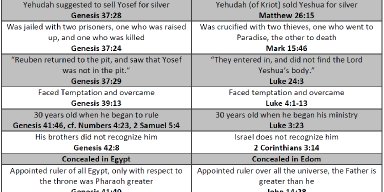שְׁמַע יִשְׂרָאֵל ה’ אֱלֹקֵינוּ ה’ אֶחָד – דברים ו, ד
This verse expresses the cardinal principle of the Jewish faith: belief in the singular existence of G-d. The deeper meaning of this “oneness” is that not only is there no deity other than the One G-d, but that G-d is in fact the one and only true existence; nothing exists outside of Him. Because since G-d’s will is the cause of any and all existence, thus the true identity of every being is the will of G-d that is continuously causing it to be, as explained at length in Tanya, Shaar Hayichud VeHaemunah . This then is the deeper meaning of “Hashem is One:” there is no existence apart from the One and Only G-d.
This idea is hinted in the Hebrew word echad , one, spelled אחד. The numerical values of these three letters are one, eight, and four, respectively. The ח, equaling eight, is symbolic of the seven skies and the earth (see Sefer Mitzvos Katan #2 ,) and the ד, equaling four, represents the four directions—north, south, east, and west. The א represents the One G-d, the singular existence Who is master over all that exists in heaven and earth and in all four directions (Shulchan Aruch, Orach Chaim 61:6).
 https://www.atzmut.com/wp-content/uploads/2015/07/shema-israel-300x129.jpg 300w, https://www.atzmut.com/wp-content/uploads/2015/07/shema-israel-128x55.jpg 128w" sizes="(max-width: 640px) 100vw, 640px">
https://www.atzmut.com/wp-content/uploads/2015/07/shema-israel-300x129.jpg 300w, https://www.atzmut.com/wp-content/uploads/2015/07/shema-israel-128x55.jpg 128w" sizes="(max-width: 640px) 100vw, 640px">
Here we see the difference between Lashon Hakodesh , the sacred Hebrew language of the Torah and all other languages. The ten utterances with which G-d created the world ( see Mishna, Avos 5:1 ), were stated in Lashon Hakodesh (Rashi, Beraishis 2:23 ). Hence, words in Lashon Hakodesh are not arbitrary. Each word reflects the Divine energy that animates the object to which it refers, i.e. its essential character ( see Shelah, 14a ). All other languages, however, are formed merely by human consensus; their words do not reveal the true nature of the articles or ideas to which they refer.
This is evident in the Aramaic translation of the word one, chad , as rendered by Targum Onkelos on this verse. The word chad contains a ח and a ד, representing all of creation, as explained above, but it is missing the א, which represents G-d. Though the meaning of the word chad is one, and in this context expresses the idea of G-d’s singular existence—just as the word echad does, yet the truth of this oneness is not as obvious and revealed in the letters of the Aramaic word chad as it is in the letters of echad in Lashon Hakodesh .
—Toras Menachem 5743, vol. 1, p. 264
Azmut.com









Devarim 4:35b also states, "Ein Ode Milvado" that is to say, "There is none else." This is often misunderstood only in the relationship to divine beings, but it means precisely what it says. There is NOTHING else. Only HaShem has singular and real independent existence and everything is a projection of His Will alone. He has no equal.
@julian-vaughan you just brought up my favorite saying , Ein Ode Milvado. I was introduced to this not very long ago. It has changed my thinking on everything. I knew intellectually that HaShem was a part of everything however when one begins to realize that there is NOTHING but HaShem one begins to realize that the material world is only an allusion.